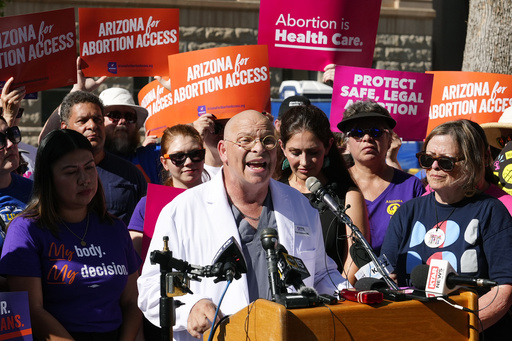
PHOENIX — On Tuesday, advocates for reproductive rights initiated a legal challenge against Arizona’s 15-week abortion ban, which contradicts a recently passed constitutional amendment aimed at enhancing access to abortion up to the point of fetal viability.
The lawsuit was filed in Maricopa County Superior Court by the American Civil Liberties Union (ACLU), Planned Parenthood, and the Center for Reproductive Rights on behalf of Planned Parenthood’s local chapter and two healthcare providers. The suit claims that the abortion prohibition infringes on the fundamental rights of pregnant individuals in Arizona, including their autonomy. This legal action represents an initial move to eliminate laws perceived as excessively restrictive.
The Arizona Legislature, which is predominantly Republican, enacted the 15-week abortion ban prior to the U.S. Supreme Court’s decision to overturn Roe v. Wade in 2022, but the ban only came into effect following that ruling. According to a spokesperson for Democratic Attorney General Kris Mayes, an agreement has been reached not to enforce this 15-week restriction while the legal process is ongoing.
Moreover, the lawsuit aims to abolish mechanisms associated with the ban that could result in criminal charges for medical providers who perform abortions past the 15-week mark unless in cases of medical emergencies. Physicians found in violation of this law might face suspension or revocation of their medical licenses.
ACLU attorney Rebecca Chan emphasized that the recent amendment does not automatically eliminate existing laws; further legal action is essential to fully realize the amendment’s benefits. “This challenge against the 15-week ban is a necessary step to cement the rights guaranteed by the amendment,” she stated.
Arizona is among five states where voters recently approved measures allowing the right to abortion to be included in their state constitutions. Additionally, Nevada has passed a similar amendment that will require a second approval in 2026 to be enacted. New York’s voters also approved a measure that prohibits discrimination based on “pregnancy outcomes.”
The impetus for Arizona’s ballot initiative was a ruling by the state Supreme Court in April that allowed enforcement of an almost total abortion ban from 1864. This ruling prompted a bipartisan effort in the state legislature to repeal the archaic law before it could be put into practice.
The constitutional amendment broadens access to abortion until the point of viability, defined as when a fetus can survive outside the womb—typically after 21 weeks of gestation. The law enables abortions beyond this threshold if deemed medically necessary to protect the mother’s physical or mental health or to save her life.
Most abortions occur early in pregnancy; statistics from the U.S. Centers for Disease Control and Prevention reveal that 93% of abortions nationwide in 2022 occurred within the first 13 weeks. However, this data may not reflect higher rates of later-term abortions in states like California.
With the general election’s certification on November 25, avenues have opened for legal challenges against laws that are at odds with this new amendment. This includes legislation mandating patients to undergo an ultrasound at least 24 hours prior to an abortion, which includes an option for them to view the visual and hear an explanation.
Following the election results, reproductive rights organizations signaled their intent to legally challenge the 15-week ban. At that time, Cathi Herrod, president of the Center for Arizona Policy, noted the group’s plans to intervene where appropriate. She expressed optimism that existing laws would remain intact, citing the government’s role in ensuring the health and safety of women.
Across the United States, many states under Republican control have placed bans or restrictions on abortion access, prompting pushback from rights advocates. For instance, in Missouri, Planned Parenthood affiliates quickly filed suit following voter approval of a measure that seeks to invalidate existing abortion bans. The situation in Missouri differs, as it has instituted an all-encompassing abortion ban with no operating clinics performing the procedure. A hearing regarding this matter is set for Wednesday.
Missouri’s Republican Attorney General Andrew Bailey has expressed plans to uphold various abortion restrictions despite the recent passage of a constitutional amendment intended to overturn the state’s near-total abortion ban.
